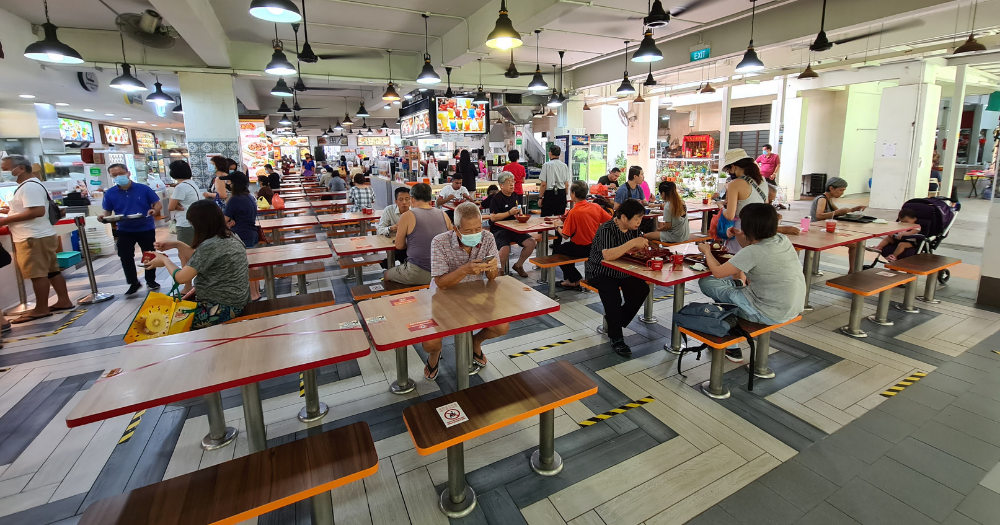Follow us on Telegram for the latest updates: https://t.me/mothershipsg
Certain Covid-19 measures in Singapore will be eased should weekly infection growth rate drop below one, multi-ministry task force (MTF) co-chair Lawrence Wong said in a press conference on Saturday, Oct. 23.
Cases still increasing but at a slower rate
The weekly infection growth rate is the ratio of locally transmitted Covid-19 cases in the past week over the week before, Wong explained.
Wong added that the ratio is a "very crude measure" of what epidemiologists call the reproduction rate or "R".
According to the finance minister, this ratio used to be 1.5, which suggested that cases were doubling every two weeks or so.
However, it has now come down to just above one, which means that cases are "still increasing but at a slower rate", he explained.
"But because cases are still increasing, it's still resulting in pressures on our healthcare system," he said, adding that the MTF will monitor this ratio "closely".
Calibrated easing subject to certain conditions
Should this ratio comes below one, and Singapore's hospital and ICU situation remains stable, the government will make some calibrated easing in the following three areas:
- Allowing team sports to resume. For example, "a group of five people can play football with another group of five people or any other contact sports".
- Resumption of more activities in schools and institutions of higher learning.
- Allowing family members from the same household to dine together in F&B establishments, up to a group of five persons.
Wong stressed that these are calibrated moves where the ministry assesses the risk to be "acceptable", and further suggested ways that the risks associated with these activities would be managed.
"For example, with activities in schools or IHLs, many of these activities are masked up, so we think the risk is acceptable," he said.
For sports, where participants are maskless and "interacting closely together, especially with contact sports", Wong said the risk can be mitigated by requiring participants to do antigen rapid tests (ART) before participating in the activity.
As for dining, while Wong acknowledged that it is "high risk", he said since the people coming to dine together are from the house same household, the risk can be "mitigated".
He added that this is an issue of enforcement.
He said, "How do we go around ensuring that across all F&B outlets, this rule is complied with strictly and it's only people from the same household?"
Middle ground approach
Wong also addressed certain questions from the public, who asked for further easing of measures, such as allowing group sizes to increase "across the board to five or even eight persons".
This is because "taking such a path of just relaxing measures across the board will cause cases to rise sharply", he said, adding that this will certainly lead to "a resurgence of cases".
Should this happen, problems may arise when the country's ICU facilities get fully occupied.
Referring to non-Covid patients as well who need ICU care, and not just Covid patients, Wong said they are already "postponing some of these elective cases", but this can't continue "indefinitely".
Therefore, this is "a critical reason" why the government doesn't want to relax measures across the board, he said.
"We want to protect our healthcare system and our healthcare workers," he added.
As for those who questioned why some areas are opened up, but not others, Wong reiterated that they are taking a balanced approach.
"We are trying very hard to take a middle ground approach, not to go into either extremes of staying put where we are, nor opening up too liberally and risking a surge of cases that can overwhelm our healthcare system," he said.
He added that this middle ground approach will require the government to be "selective", and open up in settings where they assess to be "more acceptable in terms of risk".
While this assessment, which is done with their expert advisors, will "not be perfect", should the government assess that risks are "within acceptable limits", they will make their moves accordingly, as they have done so for travel, Wong said.
"Inconsistencies" to be expected in this transition of reopening
MTF co-chair and Health Minister Ong Ye Kung addressed this concern earlier as well, saying that the government "understand everyone misses doing something they love, whether it is meeting friends, going to parties, playing sports or dining out".
He noted that businesses want to resume normal operations as well, and not be reliant on financial assistance.
However, Ong said that in the "transition" to further reopening and easing of restrictions, "the inconsistencies and then the confusion across settings is a very difficult problem to solve".
He said, "We know the extreme solutions are easy to understand, either on one end, a freedom day where all restrictions are removed, or locked down where everything is disallowed."
But "both are not the outcomes, nor the solutions we want", he added.
"So long as we decide we take a middle path between the extremes, we will have to allow some activities, or put restrictions on others. And inevitably, this will give rise to comparisons and then perceptions of inconsistencies.
But if we are prepared to live with some inconsistencies, then we have a basis to move forward."
Top image by Mothership
Follow and listen to our podcast here
If you like what you read, follow us on Facebook, Instagram, Twitter and Telegram to get the latest updates.
